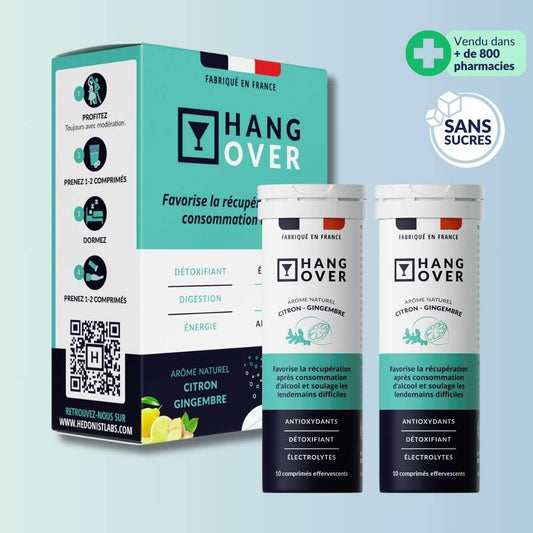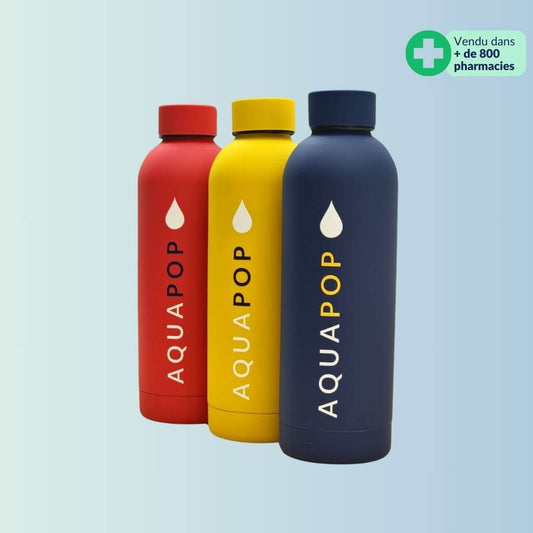Pourquoi avons-nous soif en lendemain de soirée ?
Notre corps est déshydraté.
En plus de mobiliser les réserves d’eau de notre organisme, Allen C.D., ont montré que l’alcool perturbe le fonctionnement de la glande pituitaire du cerveau, entraînant une diminution de la sécrétion de l’hormone antidiurétique.
Cette hormone intervient dans la réabsorption de l’eau par l’organisme au niveau du rein.
Plus simplement, le corps élimine plus d’eau qu’il n’en absorbe. La personne présente alors des symptômes de déshydratation, comme de la fatigue et surtout des maux de tête. N’attendez pas d’avoir soif pour vous réhydrater, car il sera trop tard.
Pourquoi avons-nous mal à la tête ?
Plusieurs raisons sont liées aux maux de tête causés par à la consommation d’alcool.
- L'alcool provoque une forte déshydratation.
- Le sucre présent dans l’alcool incite le corps à produire de l'insuline,faisant chuter notre glycémie. L’hypoglycémie induit des maux de tête.
- L’accumulation d'acétaldéhyde, un métabolite toxique de l’alcool. L’acétaldéhyde est un produit intermédiaire, généré au niveau du foie durant le processus d’élimination de l’alcool. Il est également à l'origine des symptômes liés à la gueule de bois comme les maux de tête.
Bien que l’alcool soit considéré comme un sédatif, sa consommation perturbe notre sommeil.
L'alcool se lie à de nombreux récepteurs du système nerveux central comme les récepteurs GABAA (le plus important neurotransmetteur inhibiteur du cerveau humain). Par conséquent, une consommation excessive a un effet dépresseur sur le système nerveux central, et cela influence le sommeil de plusieurs manières :
Thakkar M.M. et al., (2015), ont montré que l’alcool agissait sur le sommeil de plusieurs manières :
- Dérèglement du cycle du sommeil
- Réduction du sommeil paradoxal et perturbation du sommeil lent
- Réveils nocturnes
- Exacerbation de certains troubles du sommeil (ronflement ou encore l’apnée du sommeil)
La qualité du sommeil est donc affectée par la consommation d’alcool. *
Pourquoi sommes-nous fatigués ?
La fatigue s’explique par une combinaison de 3 facteurs :
Pourquoi a-t-on envie de manger gras ?
2 raisons sont derrières ce comportement :
- Costardi J.V. et al., (1992), ont montré que l’alcool activait les récepteurs du système endocannabinoïde qui vont provoquent une faim hédonique. C'est-à-dire une faim non justifiée par un besoin, avec un attrait pour les aliments qui vont nous faire plaisir, souvent gras et/ou sucrés.
(ce phénomène est également retrouvé après la consommation de cannabis) **
Lorsque l’on consomme de l'alcool, le seuil d’inhibition dans notre cerveau est levé. C'est-à-dire que nous laissons libre cours à nos émotions, à nos envies, sans tenir compte des conséquences et du contexte. Sur le plan biologique, l’effet désinhibiteur de l’alcool peut être expliqué par l’inhibition de deux neuromédiateurs : la noradrénaline et la sérotonine. Comme nous l’avons déjà abordé, en se fixant sur les récepteurs du GABA, l’alcool exerce une activité inhibitrice. Ici, sur la noradrénaline et la sérotonine, et en perturbe la sécrétion.
- La noradrénaline contrôle nos réactions face à un danger.
- La sérotonine contribue au contrôle de l’émotivité et de l'humeur.
Cains S. et al., (2017), ont montré que l’alcool avait une activité sur l’hypothalamus, notamment sur les neurones Agrp. Ces neurones étant impliqués dans la régulation de la sensation de faim, l’action de l’alcool sur ces derniers va diminuer notre sensation de satiété.
En temps normal, il permet de contrôler nos pulsions alimentaires et nos envies d’aliments riches en calories. Mais après quelques verres, la barrière de satiété est levée ***
Il y a-t-il un type d’alcool à éviter ?
Une étude de Brown University en 2009 a montré que les alcools bruns contenaient plus d’impuretés que ceux qui étaient clairs.
Gin, vodka, saké, Vin rouge, bière, whisky
Ces impuretés sont associées à des symptômes plus prononcés de gueule de bois.
Il faut également choisir un produit de qualité, car la qualité de l’alcool joue un rôle essentiel. Par exemple, les spiritueux qui sont mal distillés vont contenir d’autres types d’alcool comme le méthanol qui peut être dangereux à forte dose.
Pourquoi l'alcool est-il éliminé différemment d'une personne à l'autre ?
Indépendamment de la quantité consommée, le foie n’est capable de métaboliser qu’une certaine quantité d’alcool en fonction du temps. Ce processus est rapidement saturé et la vitesse de métabolisation dépend notamment de la quantité d’enzymes métaboliseurs (cytochromes) présents dans le foie. Un facteur interindividuel va définir cette quantité qui varie d’une personne à l’autre et semble être déterminé génétiquement.
Allen, C. D., (2011). Immediate and prolonged effects of alcohol exposure on the activity of the hypothalamic–pituitary–adrenal axis in adult and adolescent rats.
Brain, Behavior, and Immunity, 25, S50‑S60.
https://doi.org/10.1016/j.bbi.2011.01.016
Cains, S., (2017). Agrp neuron activity is required for alcohol-induced overeating. Nature Communications, 8(1). https://doi.org/10.1038/ncomms14014
Costardi, J. V. V., (2015). A review on alcohol : from the central action mechanism to chemical dependency. Revista da Associação Médica Brasileira, 61(4), 381‑387. https://doi.org/10.1590/1806-9282.61.04.381
Thakkar, M. et al, (2015). Alcohol disrupts sleep homeostasis. Alcohol, 49(4), 299-310. https://doi.org/10.1016/j.alcohol.2014.07.019
* https://www.educalcool.qc.ca/wp-content/uploads/2019/09/Alcool-et-sommeil.pdf
** Selon une étude publiée dans la revue Sleep
*** Une deuxième étude, parue dans la revue Health Psychology,
https://www.doctissimo.fr/sante/atlas-corps-humain/question-corps-humain/manger-gras-apres-une-soiree





